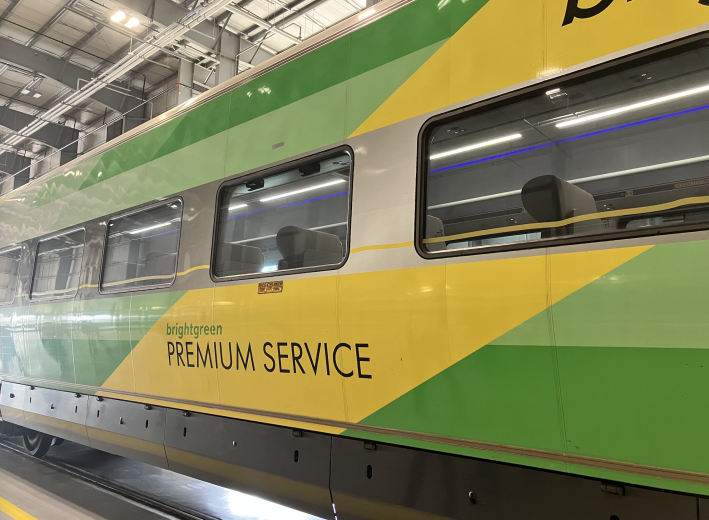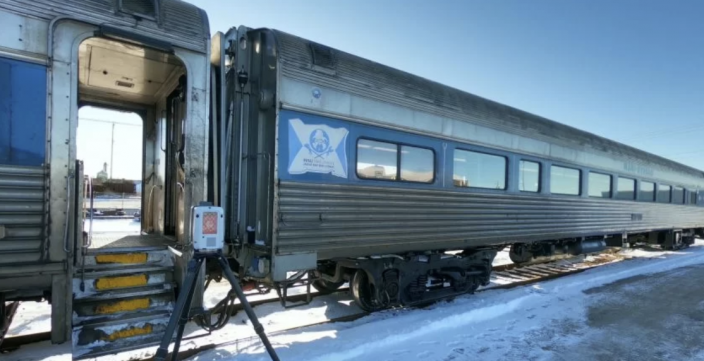Happening Now
Unique Passengers, Unique Needs: Brightline and Tshiuetin Rail
May 23, 2025
By Jim Mathews / President & CEO
I co-chaired the North American Railway Interiors Summit this week in Orlando, a conference staged by the international Red Cabin group, and among the many big takeaways from the two-and-a-half day event was this one seemingly simple, yet profound, truth: serving passengers best means listening to what they need.
What brought it home for me was the comparison between Brightline (which co-hosted the event along with trainset supplier Siemens) and the Tshiuetin Railway, operated by Tshiuetin Rail Transportation. If you just look at the surface, nothing could be more different. But a deeper dive reveals they're both especially sensitive to what their passengers want and deliver it with passion and dedication.
Brightline, launched in 2018 and now serving six stops between Miami and Orlando, Fla., is flashy, new, fast, smooth, and frankly gorgeous. Generously sized cars, wide aisles, inviting seats, world-beating food and amenities, a consistent high-end station experience, and a relentless dedication to passengers – what Brightline executives all describe as the “hospitality mindset” – all make riding Brightline a real treat. And it’s even more satisfying when you zip past all the stopped cars on I-95 or Route 1 at close to 99 mph.
Brightline carried more than 2.7 million passengers last year on a 235-mile corridor stretching along the Florida coast, serving a mix of leisure and business travelers and becoming a national-media darling along the way.

The Tshiuetin Railway operates a roughly 12-hour journey with many stops – including many flag stops – between Emeril, Labrador, and the town of Schefferville in the far north, a place that cannot be reached by roads of any kind. Born from the spine of what was a mining railroad, Tshiuetin (an Innu First Nations word meaning “North Wind”) became the first fully tribally owned regular railroad in North America about 20 years ago. Three First Nations – the Innu Takuaikan Uashat Mak Mani-Utenam, the Kawawachikamach, and the Matimekush-Lac John – bought the railroad from the mining company for a dollar and began operations in 2005.
James Berube, from the Naskapi nation and who now leads the railroad as General Manager and Chief Operating Officer, presented at the Orlando conference. He described a philosophy that may not be a “hospitality mindset” but that certainly centers passengers and their needs in every aspect of the 135-mile railroad and its service.

The flag stops, for example, exist because many First Nations people travel along the rail route to family camps for weeks at a time to practice traditional ways, hunting, fishing, gathering, preparing for the winter. Coaches accommodate entire families who may have been at their camp for as long as three weeks. Boxcars are part of the consist, too, with some walk-in refrigeration units. Why? Because families can transport the results of their hunts as they make the return journey to their homes. I asked Berube what that was, since I saw hunters loading elk on the Alaska Railroad's Hurricane flag stops; he told me it was mostly moose...animals so big they had to be quartered to be carried.
Alongside Lukasz Kozdeba, the co-owner and CEO of Canadian Railway Services, he presented a refurbishment program for Tshiuetin that will refresh and modernize the coaches while also preserving First Nations traditions and using materials in keeping with First Nations’ ethics. CRWS took many, many journeys on the route to see how people used the service and interviewed many First Nations members to understand not just how they use the train but all of the other elements that were important to them. Among the thoughtful design elements that will be incorporated is a bed-pad system adapted from airlines to convert four-place seating into lie-flat spaces for sleeping.
While not offering high-end finishes or luxury, Tshiuetin is comfortable and thoughtful and operates in a way that is exquisitely sensitive to the unique needs and sensibilities of its primarily First Nations passengers. Brightline, for its part, can be said to do very much the same thing: ensuring that food choices match passenger needs, that first-mile/last-mile offerings satisfy the requirements of Florida travelers, that ticketing and parking are convenient, and that special trains operate for events that are particularly important to Floridians – from sports events to concerts and everything in-between.
I spoke with Brightline CEO Mike Reininger at the beginning of the Summit, and he related that all employees in any capacity begin their training with a two-week session on Brightline’s hospitality culture. The cultural fit is assessed upfront, and Tom Rutkowski, the head of Brightline operations, told me that they don’t hesitate to separate those recruits who are unlikely to fit the Brightline mold.
Later in the week, walking through Brightline’s Orlando maintenance facility – which they call Brightline “Basecamp” – I saw that every single employee was proud to be part of this startup railroad, and every one of them was thinking about how what they do affects the experience of the passenger paying the fares to ride their trains.
Even though Brightline and Tshiuetin are spending their capital in different ways, they share a common objective of serving their unique customers in the ways that those customers uniquely require it. Whether it’s America’s fast-luxury railroad profiled in Fast Company magazine, or the only First Nations-owned passenger service for Canada’s frozen North, the other operators at the Summit -- including some Amtrak executives -- got an eye-opening lesson in how there are many diverse ways to put the customer first, and to reach the top rungs of success by doing it.
"Saving the Pennsylvanian (New York-Pittsburgh train) was a local effort but it was tremendously useful to have a national organization [NARP] to call upon for information and support. It was the combination of the local and national groups that made this happen."
Michael Alexander, NARP Council Member
April 6, 2013, at the Harrisburg PA membership meeting of NARP
Comments